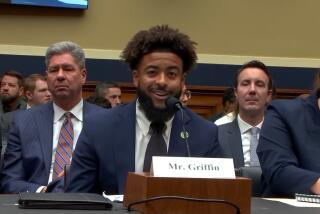NCAA Convention : Kansas City Editor Cuts Through Positive Slant of Athletes’ Survey
- Share via
SAN FRANCISCO — A newspaper executive surprised delegates to the National Collegiate Athletic Assn. Convention Monday with pointed remarks about those who have lauded the results of a survey commissioned by the NCAA to study the experiences and problems of college athletes.
Joe McGuff, vice president and editor of the Kansas City Star and Times, compared those who have praised the survey results to political spin doctors, who skew the facts to fit their needs, and described as “pure fiction” the notion of big-time college football and basketball as amateur sports.
“In a college or university, everything should be subordinated to education,” McGuff said. “I don’t think anyone can look at the facts and figures presented in this study and say that is happening.”
McGuff, a longtime sports editor and columnist at the Star and Times, was among several panelists who discussed the yearlong, $1.75-million survey, which was sponsored by the Presidents Commission.
The results of the study, released in November, indicated that football and basketball players at NCAA Division I schools spend more time each week on sports than they spend in attending and preparing for classes.
It also showed that football and basketball players score lower on standardized entrance exams and have lower high school grade-point averages than do athletes and students involved in other sports and activities.
Martin Massengale, chancellor at the University of Nebraska and chairman of the Presidents Commission, has been quoted as saying of the study: “It’s reassuring to find student-athletes so near others in the student body.”
As McGuff pointed out, the press has taken a different view.
“The facts and figures in this study prove what I already knew--that these young men are athlete-students,” McGuff said.
” . . . The picture that emerges (from survey results) is one of the big-time football or basketball player who is less gifted academically, who comes from poorer circumstances, devotes more time to sports than to academic pursuits, has substantially more academic problems and more problems living up to his academic potential, feels more isolated and has more mental, physical and personal problems than those in other sports and extracurricular programs.”
McGuff said later Monday that his comments were not made in response to those made Sunday by NCAA executive director Dick Shultz, who said the NCAA should “accentuate the positives, because 99% of everything that’s going on in intercollegiate athletics today is exceptionally positive.”
Said McGuff, who told convention delegates that he has followed college athletics for 38 years: “What I had to say was sort of a distillation of many years of discussions of these problems with various people.”
His comments were made, he said, in hopes of alerting the NCAA to the potential dangers of misinterpreting the survey data.
“The point I was trying to make is, if they try to take only the good things out of this, it will be a dead end rather than a starting point, which is what it should be,” McGuff said.
Regarding his perception that it was wrong to regard athletes in big-time college sports as amateurs, McGuff said: “How do you define professionalism? To me, professionalism is people playing a sport for gain. Well, college athletes certainly do. They get room, board, books and tuition--which, depending on the school, ranges from about $2,000 to $12,000.
“Professionalism is an institution. . . . It’s making money out of an athletic pursuit. And, in this case, the colleges are making a lot of money out of big-time football and basketball.
“What you have are players being given something of value to perform, and institutions earning substantial sums of money from their performance.”
And, McGuff told the delegates, that won’t soon change.
“There is too big a structure in place, too much money at stake and too much alumni pressure in support of the present system,” he said. “But if we are stuck with this system, let’s take steps to make sure that . . . sports are clearly subordinated to academic pursuits.”
More to Read
Go beyond the scoreboard
Get the latest on L.A.'s teams in the daily Sports Report newsletter.
You may occasionally receive promotional content from the Los Angeles Times.










